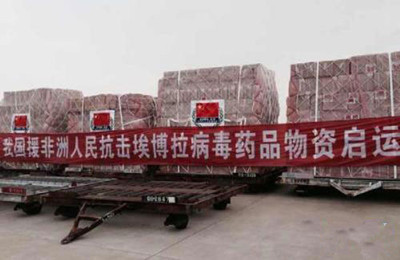The scale of China's medical aid sent overseas to combat the Ebola crisis was unprecedented in China's history.
中國派往海外抗擊埃博拉病毒危機的醫(yī)療援助規(guī)模在這個國家歷史上是前所未有的。
Following the outbreak of Ebola in February 2014, China sent over a thousand personnel and four sums of financial assistance totaling 750 million yuan.
自2014年2月埃博拉病毒爆發(fā)以來,中國已經(jīng)派出1000多名醫(yī)護人員及4次總計7.5億元的財政援助。
In mid-February this year, ten Chinese doctors will be awarded for their contributions to fighting the Ebola epidemic.
今年2月中旬,國內(nèi)10名醫(yī)生將因為英勇抗擊埃博拉疫情所作出的貢獻受到嘉獎。
As a rising power, China is in a position to contribute more to global efforts to curb such problems.
作為一個正在崛起中的大國,在全球努力遏制這種問題方面中國能夠做出更多。
However, the Ebola epidemic is not the only ongoing humanitarian crisis.
然而,埃博拉疫情并不是唯一持續(xù)的人道主義危機。

From war and disease to famine and all manner of natural disaster, there are many forms that a humanitarian crisis can take.
從戰(zhàn)爭到疾病再到饑荒及各種各樣的自然災(zāi)害,有許多形式的人道主義危機。
At the same time, effectively delivering aid to people in need is not only challenging, and complex, but also dangerous as well.
同時,對所需之人提供行之有效的援助不僅具有挑戰(zhàn)性,而且復(fù)雜還充滿了危險。
So how can we look at China's overseas aid efforts?
因此我們?nèi)绾慰创袊鴮τ诤M庠龀龅呐?
And how can the global community ensure that responses to humanitarian crises are timely and effective?
而且全球如何確保及時有效應(yīng)對人道主義危機?
譯文屬可可原創(chuàng),僅供學(xué)習(xí)交流使用,未經(jīng)許可請勿轉(zhuǎn)載












